

Below are resources towards understanding the science behind the disciplining of teenagers and how it impacts their development both psychologically and biologically. Parenting Children with Positive Reinforcement (Examples + Charts) Children don’t come with instructions and discipline is often experienced by parents and children alike as an arena where our will and wits are tested.
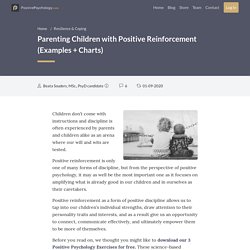
Positive reinforcement is only one of many forms of discipline, but from the perspective of positive psychology, it may as well be the most important one as it focuses on amplifying what is already good in our children and in ourselves as their caretakers. Positive reinforcement as a form of positive discipline allows us to tap into our children’s individual strengths, draw attention to their personality traits and interests, and as a result give us an opportunity to connect, communicate effectively, and ultimately empower them to be more of themselves. Before you read on, we thought you might like to download our 3 Positive Psychology Exercises for free. You can download the free PDF here. A Look at Parenting with Positive Reinforcement. The Difference Between Discipline and Punishment - Parenting For Brain. Child discipline – probably the least enjoyable part of parenting.
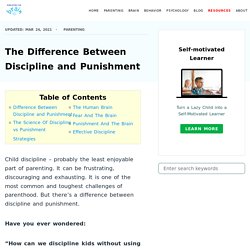
It can be frustrating, discouraging and exhausting. It is one of the most common and toughest challenges of parenthood. Discipline for Teens: Strategies and Challenges. When your child becomes a teenager, your parenting role is likely to shift.
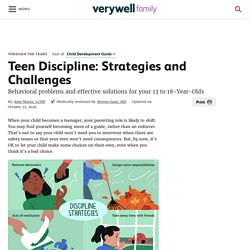
You may find yourself becoming more of a guide, rather than an enforcer. That’s not to say your child won’t need you to intervene when there are safety issues or that your teen won’t need consequences. But, by now, it’s OK to let your child make some choices on their own, even when you think it’s a bad choice. Effective discipline for children. Operant conditioning: Positive-and-negative reinforcement and punishment. Ask Jo: Handling Rebellious Teens. Peer Pressure Psychology - How Group Think Happens. How to Punish (and How Not to Punish) a Teenage Boy. Ugh.

You just found out that your son has done something really bad. The kind of bad that makes you want to deny you know him. Parenting A Teen Through Positive Reinforcement - Back On Track. Most parents can agree: the teenage years can be rough!
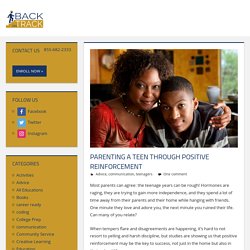
Hormones are raging, they are trying to gain more independence, and they spend a lot of time away from their parents and their home while hanging with friends. One minute they love and adore you, the next minute you ruined their life. Can many of you relate? When tempers flare and disagreements are happening, it’s hard to not resort to yelling and harsh discipline, but studies are showing us that positive reinforcement may be the key to success, not just in the home but also in their school life. Use Positive Reinforcement to Help Change Behavior - Partnership to End Addiction. In households where a child is using substances, it can be easy to focus on everything the child is doing wrong and respond with lectures, punishment and confrontation.
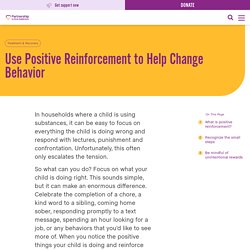
Unfortunately, this often only escalates the tension. So what can you do? Focus on what your child is doing right. Why Children Need Positive Reinforcement. Giving kids positive reinforcement is always important.
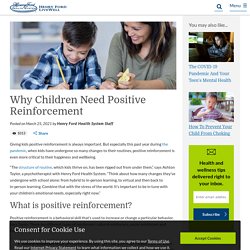
But especially this past year during the pandemic, when kids have undergone so many changes to their routines, positive reinforcement is even more critical to their happiness and wellbeing. “The structure of routine, which kids thrive on, has been ripped out from under them,” says Ashton Taylor, a psychotherapist with Henry Ford Health System. “Think about how many changes they’ve undergone with school alone: from hybrid to in-person learning, to virtual and then back to in-person learning. Combine that with the stress of the world. Parenting Children with Positive Reinforcement (Examples + Charts) 5 Effective Positive Reinforcement Tips for Your Child with ADHD - CHADD. ADHD Weekly 2016-06-30 Are you looking for some tips to help manage your child’s behavior during the summer?
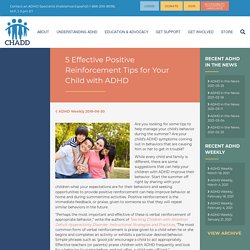
Are your child’s ADHD symptoms coming out in behaviors that are causing him or her to get in trouble? While every child and family is different, there are some suggestions that can help your children with ADHD improve their behavior. Child Development: Ages and Stages - CHOC Children's. Understanding your child’s changing growth and development milestones is an important part of parenting.
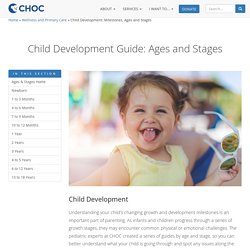
As infants and children progress through a series of growth stages, they may encounter common physical or emotional challenges. The pediatric experts at CHOC created a series of guides by age and stage, so you can better understand what your child is going through and spot any issues along the way. Growth and development includes not only the physical changes that occur from infancy to adolescence, but also some of the changes in emotions, personality, behavior, thinking and speech that children develop as they begin to understand and interact with the world around them. Skills such as taking a first step or smiling for the first time are called developmental milestones. The Study of Cognitive Development in Understanding Child Development. Memory is another major aspect of cognitive development.
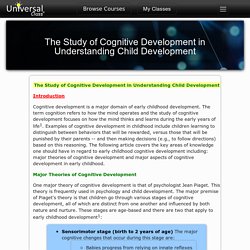
There is evidence that infants have memory1. However, the phenomenon called infantile amnesia refers to the human tendency to not be able to remember experiences before around the age of 3. Possible explanations for this type of amnesia are that the way the human brain stores memory changes from infancy throughout the rest of development; for instance, it may be difficult to store a memory in verbal terms before the ability to talk or understand language has developed; and that humans lack a sense of self in infancy and therefore cannot form clear stories about experiences that lead to actually remembering experiences1. Early childhood social and emotional development: Advancing the field of measurement. Highlights Discusses current approaches to measuring social and emotional development in early childhood Presents major measurement challenges associated with this domain.
Discipline for Teens: Strategies and Challenges. Effective Parenting Techniques - 7 Ways to Start Parenting More Effectively. Many parents write in to Empowering Parents and ask, “Is it too late to change the way I parent my child—and will it actually work if I do?” In this article, James Lehman explains how you can change the way you parent, and why your child’s behavior has a much better chance of improving when you do. James gives you 7 ways to be a more effective parent, starting today. Work on the behavior you want to change most—then, move on to the next one.